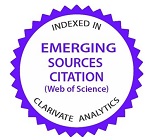Abstract
Globularia alypum (GA), a plant of the Globulariacea family, has long been used as a traditional cure for inflammatory and metabolic illnesses.In addition to various in vitro model studies, the current work focuses on GA'santioxidant and anti-inflammatory properties in human colon biopsies.
Liquid Chromatography-Electrospray Ionization Mass Spectrometry identified the phenol components in GA aqueous extract (GAAE).The antioxidant ability of GAAE was tested in vitro utilizing chemiluminescence and flow cytometry using fluorescent yeastsn conjunction with PLB-985-human myeloid leukemia cells. Experiments on human colon biopsies after a biopsy challenge with Escherichia coli-lipopolysaccharides aimed tosee if GAAE had an anti-inflammatory impact on human colon inflammation.Western blotting was used to assessthe expression of several inflammatory markers.
According to the findings, GAAE had a significant influence on hydrogen peroxide and cellular reactive oxygen species.GAAE inhibited the activities of cyclooxygenase 2 and nuclear factor B in inflamed biopsies, indicating anti-inflammatory action.The present study is the first to show that GA has a beneficial effect on human colon inflammation, thanks to its significant antioxidant activity in vitro.According to these preliminary data, GA should be further studies integrative supporting human gastrointestinal inflammatory diseases.
Recommended Citation
Hajji, Najla; Hudik, Elodie; Iovino, Paola; Zouari, Nacim; Sebai, Hichem; Nusse, Oliver; and Ciacci, Carolina
(2021)
"Globularia Alypum L. Modulates Inflammatory Markers in the Human Colon and shows a Potential Antioxidant Role in Myeloid Leukemic Cells,"
Translational Medicine @ UniSa: Vol. 24
:
Iss.
1
, Article 4.
Available at:
https://doi.org/10.37825/2239-9747.1028
Creative Commons License

This work is licensed under a Creative Commons Attribution 4.0 License.
Included in
Alternative and Complementary Medicine Commons, Health Communication Commons, Life Sciences Commons




